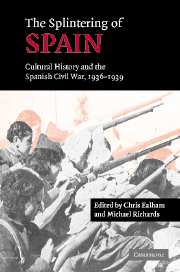Book contents
- Frontmatter
- Contents
- List of illustrations
- List of maps
- List of contributors
- Preface
- List of abbreviations
- Chronology
- Maps showing the division of Spain, 1936-1939
- 1 History, memory and the Spanish civil war: recent perspectives
- Part I Overviews: violence, nationalism and religion
- 2 The symbolism of violence during the Second Republic in Spain, 1931–1936
- 3 Nations in arms against the invader: on nationalist discourses during the Spanish civil war
- 4 ‘The keys of the kingdom’: religious violence in the Spanish civil war, July–August 1936
- Part II Republican political and cultural projects
- Part III Identities on the Francoist side
- Notes
- Index
3 - Nations in arms against the invader: on nationalist discourses during the Spanish civil war
Published online by Cambridge University Press: 28 July 2009
- Frontmatter
- Contents
- List of illustrations
- List of maps
- List of contributors
- Preface
- List of abbreviations
- Chronology
- Maps showing the division of Spain, 1936-1939
- 1 History, memory and the Spanish civil war: recent perspectives
- Part I Overviews: violence, nationalism and religion
- 2 The symbolism of violence during the Second Republic in Spain, 1931–1936
- 3 Nations in arms against the invader: on nationalist discourses during the Spanish civil war
- 4 ‘The keys of the kingdom’: religious violence in the Spanish civil war, July–August 1936
- Part II Republican political and cultural projects
- Part III Identities on the Francoist side
- Notes
- Index
Summary
Since the eighteenth century the development of European nationalisms has been directly linked to war. Military conflicts create socio-psychological borders among ethnic and national groups, and delineate sharp contrasts between ‘us’ and ‘them’ by stereotyping the other. Therefore, war provides at least two mutually reinforcing effects for nationalism. First, the wartime social environment and the cult of the nation in arms create internal cohesion, minimise dissent and reinforce a deeper sentiment of community based on strong emotional ties such as blood and sacrifice, common suffering and shared destiny. Second, military action conclusively formulates a stereotyped image of the other, which is just as necessary for consolidating the national identity as the previous task of nation-building carried out by institutions, intellectual elites or social movements. Patriotic wars have strongly contributed to the consolidation of the variegated nation-building processes that were under way in nineteenth- and twentieth-century Europe.
The Spanish civil war was no exception to this European trend. It is paradoxical that this civil conflict was perceived as a patriotic war by most of the political elites on either side. Both sides excluded the other from being considered as true Spaniards and this exclusion persisted to some extent throughout the following forty years. The process of conveniently ‘forgetting’ the Spanish civil war during the transition to democracy, after Franco's death, in order to avoid reviving the armed conflict and reawakening the ‘ghost’ of the permanently irreconcilable two Spains was the result of a political consensus among Francoist reformers and democrats.
- Type
- Chapter
- Information
- The Splintering of SpainCultural History and the Spanish Civil War, 1936–1939, pp. 45 - 67Publisher: Cambridge University PressPrint publication year: 2005
- 18
- Cited by

